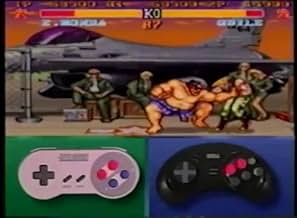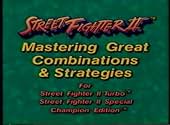Narrator: These general strategies can make the difference between winning occasionally and winning consistently, so listen up: You have to know each character's strengths and weaknesses, as well as your opponent's strengths and weaknesses. You have to know all your counter moves to any character's attack. Forget these, and you can forget about winning. Know your character's prime attack differences. Each character has a distance he fights most effectively from. It depends on the character and who he or she is fighting. Be aware of energy levels during play. Always know who is winning, and by how much. If you know you have a lead, then you can expect your opponent to play more aggressively and to attack more carelessly. Be ready to see your opening, and go for it to increase your lead. Be aware of the clock. The amount of time will affect your opponent's play style, and yours. Be creative. Don't fall into recognizable patterns of moves; mix things up to confuse your opponent and make it harder for him to predict your next attack. If you can surprise yourself, chances are good you can surprise your opponent too. Remember that throws are an important part of the game. Keep grabs part of your offensive arsenal. Remember: There are no rules. Anything goes. Practice is all important, but only if you practice to improve. Don't be satisfied with mediocrity; learn from your mistakes, and constantly strive to keep from repeating them. Once a game is started, try to conservatively establish a small lead at the beginning of the round. This will usually make your opponent more aggressive and careless. If you aren't able to establish a lead, then look for opportunities to get into your prime attack distance. And finally, keep the pressure on by never letting up on your offense, even if you're winning.





